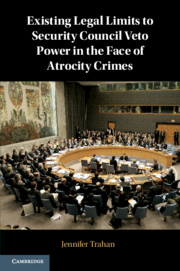Book contents
- Existing Legal Limits to Security Council Veto Power in the Face of Atrocity Crimes
- Existing Legal Limits to Security Council Veto Power in the Face of Atrocity Crimes
- Copyright page
- Contents
- Foreword
- Acknowledgments
- Introduction
- 1 The Origins and History of the Veto and Its Use
- 2 Acting in the Face of Atrocity Crimes
- 3 Initiatives to Voluntarily Restrain Veto Use in the Face of Atrocity Crimes
- 4 Questioning the Legality of Veto Use in the Face of Genocide, Crimes against Humanity, and/or War Crimes
- 5 Case Studies
- Index
4 - Questioning the Legality of Veto Use in the Face of Genocide, Crimes against Humanity, and/or War Crimes
Published online by Cambridge University Press: 15 August 2020
- Existing Legal Limits to Security Council Veto Power in the Face of Atrocity Crimes
- Existing Legal Limits to Security Council Veto Power in the Face of Atrocity Crimes
- Copyright page
- Contents
- Foreword
- Acknowledgments
- Introduction
- 1 The Origins and History of the Veto and Its Use
- 2 Acting in the Face of Atrocity Crimes
- 3 Initiatives to Voluntarily Restrain Veto Use in the Face of Atrocity Crimes
- 4 Questioning the Legality of Veto Use in the Face of Genocide, Crimes against Humanity, and/or War Crimes
- 5 Case Studies
- Index
Summary
This chapter makes the case that it is appropriate, and justified, to revisit – based on existing international legal obligations – the problem of veto use in the face of genocide, crimes against humanity, and/or war crimes. The chapter presents three main legal arguments that indicate there are legal limits (or constraints) on the use of the veto in the face of genocide, crimes against humanity, and/or war crimes. First, the chapter argues that the veto power, which is conferred by the UN Charter, is subordinate to the highest-level jus cogens norms; as a consequence, the veto should not be used (i) where it has the effect of facilitating ongoing jus cogens violations, (ii) where it undermines the duty of other Security Council members to cooperate to make an appropriate response to a serious breach of a jus cogens norm, or (iii) where its use is inconsistent with jus cogens protections. Second, the chapter argues that the veto power sits within the context of the UN Charter, which states that the Security Council must act pursuant to the UN’s “Purposes and Principles”; a veto in the face of genocide, crimes against humanity, and/or war crimes does not accord with the UN’s “Purposes and Principles.” Third, the chapter argues that there are also treaty obligations that bind individual permanent member states, such as those under the Genocide Convention and 1949 Geneva Conventions, and veto use should not be contrary to obligations created under these treaties.
In light of the issues raised, the chapter considers the scope of judicial review by the International Court of Justice (“ICJ”), concluding that the above legal questions are ones on which the ICJ could, and should, opine. Ultimately, the chapter suggests that the General Assembly consider requesting an advisory opinion from the ICJ on a question such as: does existing international law contain limitations on the use of the veto power by permanent members of the UN Security Council in situations where there is ongoing genocide, crimes against humanity, and/or war crimes?
Keywords
- Type
- Chapter
- Information
- Publisher: Cambridge University PressPrint publication year: 2020



